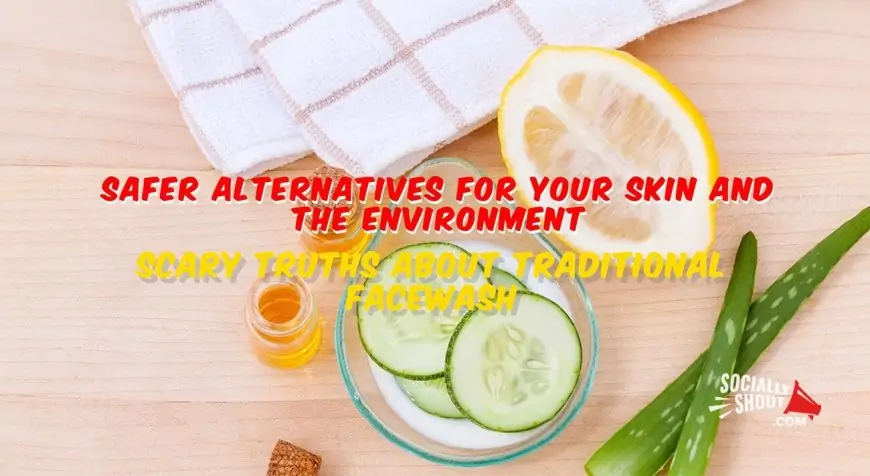Scary Truths About Traditional Facewash and Safer Alternatives for Your Skin and the Environment: In today's society, people are becoming increasingly concerned about their personal health and well-being. As a result, there has been a surge in the popularity of skincare products. With so many options available on the market, it can be challenging to determine which products are best suited for our needs. Traditional facewash is a popular skincare product that many of us use daily. But have you ever stopped to consider the ingredients in your facewash? In this article, we'll uncover some of the scary truths about traditional facewash and why you might want to consider switching to a more natural alternative.
Many traditional facewashes contain harmful chemicals that can be damaging to your skin and your overall health. These chemicals include parabens, sulfates, and phthalates. Parabens are preservatives commonly used in cosmetics and personal care products. Studies have linked parabens to hormonal imbalances and even breast cancer. Sulfates are harsh detergents that strip your skin of its natural oils, leaving it dry and irritated. Phthalates are plasticizers used to make products more flexible and durable. However, they have been linked to developmental and reproductive toxicity.
Introduction
Facewash is a common part of many people's daily skincare routine. It's marketed as an effective way to cleanse the skin and remove impurities, leaving your face feeling fresh and clean. However, what many people don't realize is that some of the ingredients in facewash can be harmful to both your health and the environment.
In this article, we'll explore some of the scary facts about using facewash. We'll look at the harmful effects of harsh ingredients and microbeads, the link between facewash and antibiotic resistance, and the environmental impact of facewash. We'll also offer some alternatives to traditional facewash that are safer and more sustainable.
The Problem with Harsh Ingredients
Many facewash products contain harsh ingredients that can damage your skin. These ingredients are often added to give the product a pleasant scent or texture, but they can actually do more harm than good.
For example, many facewash products contain sulfates, which are harsh detergents that can strip your skin of its natural oils. This can leave your skin feeling dry and irritated, and can even lead to acne breakouts.
Other common ingredients in facewash products include alcohol and fragrances. Alcohol can dry out your skin and cause irritation, while fragrances can cause allergic reactions and skin sensitivities.
The Dangers of Microbeads
Microbeads are tiny plastic beads that are often added to facewash products to provide exfoliation. However, these beads are incredibly harmful to the environment.
When you use a facewash product that contains microbeads, the beads get washed down the drain and end up in our waterways. These beads don't biodegrade, so they can stay in the environment for hundreds of years. They can also be mistaken for food by marine life, which can lead to serious health problems and even death.
The Link between Facewash and Antibiotic Resistance
Another scary fact about using facewash is the link between facewash and antibiotic resistance. Many facewash products contain triclosan, which is an antibacterial agent. However, overuse of triclosan can lead to antibiotic resistance, which can make it harder to treat bacterial infections.
Antibiotic resistance is a serious public health problem that can lead to longer hospital stays, higher healthcare costs, and even death. By using facewash products that contain triclosan, you may be contributing to this growing problem.
The Environmental Impact of Facewash
In addition to the harm that facewash can cause to your skin and health, it can also have a significant impact on the environment. The chemicals in facewash can be harmful to aquatic life, and the plastic packaging can contribute to landfill waste.
Furthermore, many facewash products are tested on animals, which can lead to unnecessary suffering and death.
Alternatives to Traditional Facewash
Fortunately, there are alternatives to traditional facewash that are safer and more sustainable. Some options include:
- Oil cleansing: This method involves using oils to cleanse your skin, which can be gentler andless stripping than traditional facewash. You can use oils like coconut, jojoba, or almond oil to cleanse your skin.
- Micellar water: Micellar water is a gentle, no-rinse cleanser that can effectively remove dirt, oil, and makeup from your skin. It's also more sustainable than traditional facewash, as it doesn't require water to use.
- Natural facewash: Look for facewash products that are made with natural, non-toxic ingredients. There are many brands out there that offer gentle, effective facewash options that are safe for your skin and the environment.
Conclusion
Using facewash may seem like a harmless part of your daily routine, but the reality is that it can have some scary consequences. From harsh ingredients that can damage your skin to microbeads that are harmful to the environment, there are many reasons to reconsider your use of traditional facewash.
Fortunately, there are alternatives that are safer and more sustainable. By choosing gentler, more natural options, you can protect your skin and the environment while still keeping your face feeling fresh and clean.


















